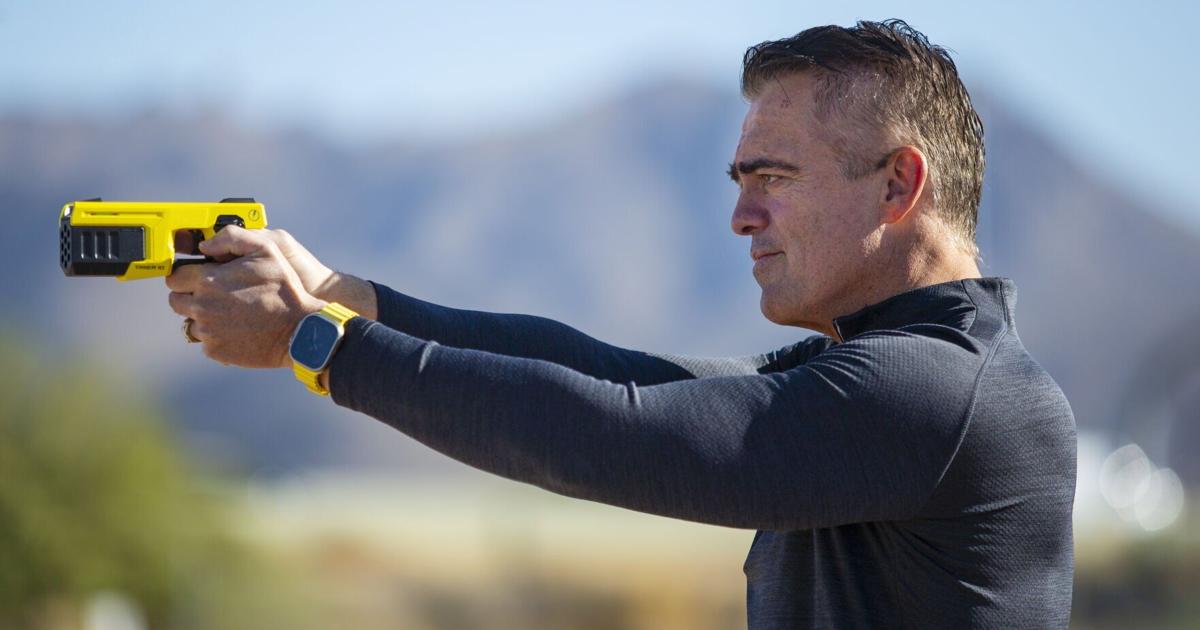Though company founder Rick Smith graduated from Chaparral High and grew his company from a fledgling to an international giant here, Axon’s relationship with Scottsdale is perhaps politely described as “complicated.”
If this is a city-corporation marriage, Smith has threatened divorce many times – during rages over blocks to his expansion plans.
It’s been a topsy-turvy relationship at best, with City Council approving Axon’s apartments-hotel-office expansion in North Scottsdale last November. Now, a much-different City Council is pondering joining a lawsuit that would topple a new state law and allow voters to decide on Axon’s needed rezoning.
At a “special meeting” called for 3 p.m. Monday, Nov. 17, City Council will consider everything from joining the TAAAZE lawsuit to a new deal with Axon that would reduce the number of apartments by half (from the planned 1,882 apartments to 750 apartments and 750 condominiums).
By sharp contrast, investors have embraced the Taser and police body camera maker as “darling.” Revenue growth ranging from powerful to almost shocking drew universal praise, sending Axon’s stock price into orbit.
Until last week.
As CNBC reported, “Axon Enterprise’s stock plummeted 9% after the Taser maker missed Wall Street’s third-quarter profit expectations.”
The villain here: tariffs.
On Nov. 4, Axon reported third quarter 2025 revenue of $711 million – up 31% year over year.
Can’t beat that, right?
Well …
As CNBC explained, “Adjusted earnings totaled $1.17 per share, falling short of a $1.52 per share forecast from LSEG. Adjusted gross margins dropped 50 basis points from a year ago to 62.7%, which Axon attributed to tariff impacts.”
Axon’s connected devices business, which includes its Taser and counter drone equipment, felt the biggest pinch during the first full quarter with tariffs, according to the story. Even so, the business segment accounted for more than $405 million in revenue, increasing 24% year over year.
Yet, the finance world was not giving Axon a “pass,” even though Smith and company were not hiding anything.
As a Reuters story noted, “Earlier this year, Axon had warned that tariffs could hinder the procurement of imported raw materials and limit exports.
“The company buys components from suppliers in the U.S., Taiwan, Mexico, China, Vietnam, Thailand and the Republic of Korea, as per its latest annual report.”
The Arizona-based company reported a net loss of $2.2 million, or a loss of 3 cents per share, versus net income of $67 million, or 86 cents per share in the year-ago period.
During the earnings call, Brittany Bagley – Axon’s finance chief – said tariffs are “sort of a one-time adjustment.”
She said Axon expects growth in the company’s software business to eventually offset tariff-driven margin losses long term. Software and services revenue jumped 41% from a year ago to $305 million.
Axon continues to project huge sales growth, raising its full-year revenue outlook to $2.74 billion.
The company expects revenue between $750 million and $755 million during the fourth quarter.
‘Axon 911’
During the earnings call that sent the stock price plummeting, Smith was as optimistic as ever, just about bubbling over as he talked about a new project.
Smith unveiled Axon 911, an AI-driven 911 system that he called “a major leap toward” and “lightning fast for public safety.”
The Axon founder said the speed of humans taking crisis calls pales, compared to “intelligent, AI-enabled communications that process information at superhuman speed.”
As a press release explained, the system builds on recent Axon acquisitions: “Prepared and Carbyne are complementary platforms that modernize 911 call taking and response and pave the way for Axon 911.”
The company changed its name from Taser years ago for a reason, Smith underscored during the call with investors.
“We named the company Axon,” he said, “because it’s all about the axons of the nerve fibers that connect everything together into the sophisticated nervous system that is a human being.
“We’re building the nervous system of the modern police agency and these two acquisitions (Prepared and Carbyne) move us into really being a major player in voice communications and really an ability to link in the consumer right from that first 911 call.”
Smith’s bottom line:
“We’re incredibly excited about what we’re building. The future we envision is coming together and it’s even more inspirational than I could have imagined a decade ago.”
While Smith was focused on the future, investors processed the third quarter results – and many jumped ship.
After rocketing to $865 per share in June, Axon’s stock fell and kept falling over the week, down to under $600.
